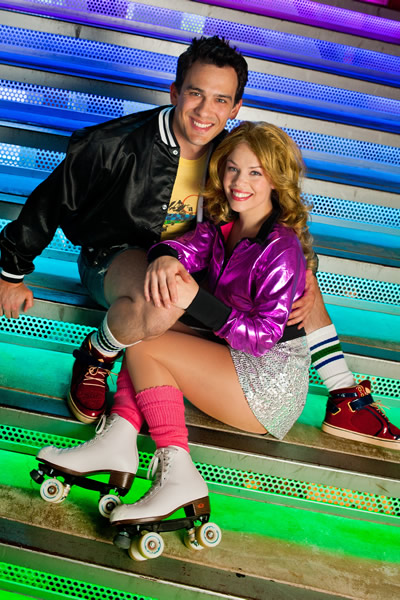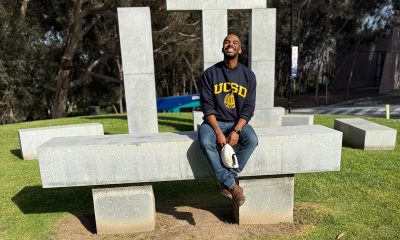Arts & Entertainment
Skating into Signature
Gay-helmed musical ‘Xanadu’ gets regional premiere
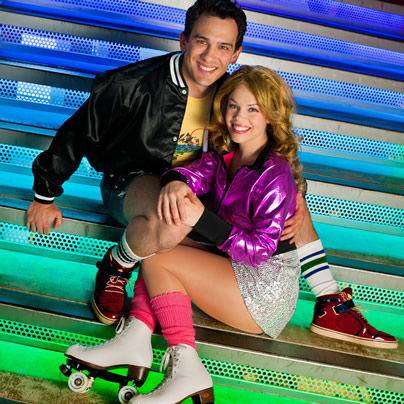
‘Xanadu’
May 8-July 1
Signature Theatre
4200 Campbell Ave., Arlington
$62-$86
703-820-9771
Had the 1980 roller disco flick “Xanadu” never been made into the same-titled Broadway musical comedy, the clunky Olivia Newton-John vehicle would most likely have been relegated to the narrow shelf reserved for similar cult films.
A mostly awkward paean to mythology and passing fads, the movie’s saving distinctions include an ear worm-y pop score split between Newton-John’s personal composer John Farrar and Electric Light Orchestra’s Jeff Lynne, a parade of curiously hideous disco-era costumes and the fact that it features MGM’s dance legend Gene Kelly on skates in his final movie role.
Happily, the movie has been hilariously reimagined as “Xanadu,” the hit musical that’s poised to make its Washington premier at Signature Theatre this week. What’s most striking about the show is the way it pairs a sugary screen score (“Xanadu,” “Magic,” “Have You Ever Been Mellow,” etc.) with the sophisticated wit of gay playwright Douglas Carter Beane who’s also written librettos for “Sister Act” and “Lysistrata Jones.” He also wrote “To Wong Foo, Thanks for Everything! Julie Newmar,” “The Little Dog Laughed” and “As Bees in Honey Drown.”
Via phone from Manhattan, he describes “Xanadu’s” leap from screen to stage as the brainchild of the movie’s primary producer Rob Ahrens. After being let go by one of the major studios, Beane explains, Ahrens took a surfing trip to Central America. While lying on his board waiting for a wave, Ahrens formulated his next move — he needed to bring “Xanadu” to Broadway. Through mutual friends Ahrens was advised that Beane was the right man to pen the adaptation. Beane was skeptical.
“I knew the film,” he says. “In the early days of HBO, I think they played ‘Xanadu’ and ‘Clash of the Titans’ on an endless loop. Anyone who ever skipped school in those days knew them well. They’re not good. I remember telling my agent that the job sounded like a real résumé stopper. But Ahrens was relentless. He said I could do whatever I wanted, so I took another look at the film. It was still bad — it had become all nostalgia without the cumbersome taste.”
The plot is simple: Greek muse Clio leaves Mount Olympus for early 1980s Venice Beach, Calif., where, disguised as an Australian roller girl named Kira, she hopes to inspire artist Sonny in creating his decisive achievement, a roller disco. When Clio falls into forbidden love with Sonny, her jealous sisters see it as an opportunity to make trouble.
“Greek muses. Inspiration,” Beane says. “That’s the beginning of theater — everything we hold to be good, pure and beautiful. On the other hand, putting a bad movie on stage is the absolute butt hole end of theater. What would happen if I put classic Greek and ‘80s trashiness together? What would Aristophanes say? And I just started writing. I’d found my way in as they say. … I wrote the dialogue as if it were a good Edith Hamilton translation of the classics, but set in the 1980s. In turn, the set designer created a Greek amphitheater that was a really a disco roller rink. The choreographer fused Solid Gold with Martha Graham. The actors pulled out their best classical voices. Everything fell into place quickly; it all worked.”
Xanadu opened on Broadway May of 2007, ran for more than 500 performances and garnered Beane a Drama Desk Award for Best Book. Gay actor Cheyenne Jackson played Sonny.
Signature’s “Xanadu” is directed and choreographed by Matthew Gardiner, the company’s associate artistic director, and stars Helen Hayes Award-winner Erin Weaver and handsome Charlie Brady (“South Pacific” on Broadway) as Clio and Sonny. Local favorites Sherri L. Edelen and Harry A. Winter, and big-voiced recent Helen Hayes Award-winner Nova Y. Payton are also featured.
Gardiner, 28, first saw “Xanadu” with Signature’s artistic director Eric Schaeffer during its New York run.
“As we left the theater, I remember thinking it was the most joyous, funny smart work I’d seen in a long time. I said to Eric that I had to direct this show sometime, someplace,” Gardiner says. “Time passed and he [Schaeffer] randomly told me that we were putting ‘Xanadu’ in this season. He thought it would be a good fit and that I’d be directing.”
He says the show works for reasons that aren’t obvious.
“Audiences love it because it’s funny, but they probably won’t see — and I wouldn’t expect them to see — what a well-crafted piece of theater it is. With its satyr play and party at the end, it’s like a Greek drama. I noticed that when I saw the New York production.”
Gardiner admits a weird fondness for the film version. When they were about 5, Gardiner and his twin brother James Gardiner (a talented local actor) spent a lot of time watching it and “Grease,” also with Olivia Newton-John. Gardiner says to enjoy “Xanadu,” the musical, it’s not mandatory to know the movie, but a cursory knowledge of its leading lady and her music, and a sense of what the ‘80s were, certainly helps.
Native to the D.C. area, Gardiner grew up in the arts. He played Tiny Tim at Ford’s Theatre and danced in the “Nutcracker” for 10 years at the Washington School of Ballet. He successfully co-directed and choreographed the terrifically fun and campy “Reefer Madness” and “Jerry Springer: The Opera” at Studio 2ndstage. He was named Signature’s associate artistic director just prior to this year’s season. Most recently he staged Signature’s hit premier “Really Really,” Paul Downs Colaizzo’s play about self-serving young adults and an alleged date rape.
After “Really Really,” Gardiner, who’s gay, says he was ready for something fun. With “Xanadu,” a brisk 90-minute zany sendup of a really bad ‘80s movie, he found his antidote. “It’s been great finding beats, punch lines and gags, but I’ve also enjoyed exploring the show’s real intentions underneath — love and joy and real life emotions. The process has been joyous.”
Young actor Mark Chandler, a pop tenor whose voice is perfect for the score, is thrilled to be cast in the production. As part of the ensemble, he plays assorted characters including one of the Greek muses. And while he’s been singing, acting and dancing professionally for some time, this is his first time on skates before an audience. Luckily, a skating instructor (Gregory VanderPloeg) was brought to bring the actors up to speed.
“Before ‘Xanadu,’ the last time I skated was at a birthday party in L.A. a couple years ago, and nobody was entirely sober,” says Chandler, also gay. “I can tell you, learning to skate has been a bonding experience for the cast. Falling and embarrassing yourself repeatedly does that.”
He and the cast, says Chandler, have a come a long way in little time. Now he’s performing all sorts of tricks — jumps, leaps and cartwheels on skates — and he does them all in gold sequined and lamé booty shorts no less.
“I didn’t know much about the movie. I first watched it after I was cast. It’s interesting,” he says diplomatically. “But the musical is another story. It’s a good time. I promise you’ll walk out of the theater laughing, and you’ll probably have a little glitter on you too.”
Movies
Radical reframing highlights the ‘Wuthering’ highs and lows of a classic
Emerald Fennell’s cinematic vision elicits strong reactions

If you’re a fan of “Wuthering Heights” — Emily Brontë’s oft-filmed 1847 novel about a doomed romance on the Yorkshire moors — it’s a given you’re going to have opinions about any new adaptation that comes along, but in the case of filmmaker Emerald Fennell’s new cinematic vision of this venerable classic, they’re probably going to be strong ones.
It’s nothing new, really. Brontë’s book has elicited controversy since its first publication, when it sparked outrage among Victorian readers over its tragic tale of thwarted lovers locked into an obsessive quest for revenge against each other, and continuing to shock generations of readers with its depictions of emotional cruelty and violent abuse, its dysfunctional relationships, and its grim portrait of a deeply-embedded class structure which perpetuates misery at every level of the social hierarchy.
It’s no wonder, then, that Fennell’s adaptation — a true “fangirl” appreciation project distinguished by the radical sensibilities which the third-time director brings to the mix — has become a flash point for social commentators whose main exposure to the tale has been flavored by decades of watered-down, romanticized “reinventions,” almost all of which omit large portions of the novel to selectively shape what’s left into a period tearjerker about star-crossed love, often distancing themselves from the raw emotional core of the story by adhering to generic tropes of “gothic romance” and rarely doing justice to the complexity of its characters — or, for that matter, its author’s more complex intentions.
Fennell’s version doesn’t exactly break that pattern; she, too, elides much of the novel’s sprawling plot to focus on the twisted entanglement between Catherine Earnshaw (Margot Robbie), daughter of the now-impoverished master of the titular estate (Martin Clunes), and Heathcliff (Jacob Elordi), a lowborn child of unknown background origin that has been “adopted” by her father as a servant in the household. Both subjected to the whims of the elder Earnshaw’s violent temper, they form a bond of mutual support in childhood which evolves, as they come of age, into something more; yet regardless of her feelings for him, Cathy — whose future status and security are at risk — chooses to marry Edgar Linton (Shazad Latif), the financially secure new owner of a neighboring estate. Heathcliff, devastated by her betrayal, leaves for parts unknown, only to return a few years later, with a mysteriously-obtained fortune. Imposing himself into Cathy’s comfortable-but-joyless matrimony, he rekindles their now-forbidden passion and they become entwined in a torrid affair — even as he openly courts Linton’s naive ward Isabella (Alison Oliver) and plots to destroy the entire household from within. One might almost say that these two are the poster couple for the relationship status “it’s complicated.” and it’s probably needless to say things don’t go well for anybody involved.
While there is more than enough material in “Wuthering Heights” that might easily be labeled as “problematic” in our contemporary judgments — like the fact that it’s a love story between two childhood friends, essentially raised as siblings, which becomes codependent and poisons every other relationship in their lives — the controversy over Fennell’s version has coalesced less around the content than her casting choices. When the project was announced, she drew criticism over the decision to cast Robbie (who also produced the film) opposite the younger Elordi. In the end, the casting works — though the age gap might be mildly distracting for some, both actors deliver superb performances, and the chemistry they exude soon renders it irrelevant.
Another controversy, however, is less easily dispelled. Though we never learn his true ethnic background, Brontë’s original text describes Heathcliff as having the appearance of “a dark-skinned gipsy” with “black fire” in his eyes; the character has typically been played by distinctly “Anglo” men, and consequently, many modern observers have expressed disappointment (and in some cases, full-blown outrage) over Fennel’s choice to use Elordi instead of putting an actor of color for the part, especially given the contemporary filter which she clearly chose for her interpretation for the novel.
In fact, it’s that modernized perspective — a view of history informed by social criticism, economic politics, feminist insight, and a sexual candor that would have shocked the prim Victorian readers of Brontë’s novel — that turns Fennell’s visually striking adaptation into more than just a comfortably romanticized period costume drama. From her very opening scene — a public hanging in the village where the death throes of the dangling body elicit lurid glee from the eagerly-gathered crowd — she makes it oppressively clear that the 18th-century was not a pleasant time to live; the brutality of the era is a primal force in her vision of the story, from the harrowing abuse that forges its lovers’ codependent bond, to the rigidly maintained class structure that compels even those in the higher echelons — especially women — into a kind of slavery to the system, to the inequities that fuel disloyalty among the vulnerable simply to preserve their own tenuous place in the hierarchy. It’s a battle for survival, if not of the fittest then of the most ruthless.
At the same time, she applies a distinctly 21st-century attitude of “sex-positivity” to evoke the appeal of carnality, not just for its own sake but as a taste of freedom; she even uses it to reframe Heathcliff’s cruel torment of Isabella by implying a consensual dom/sub relationship between them, offering a fragment of agency to a character typically relegated to the role of victim. Most crucially, of course, it permits Fennell to openly depict the sexuality of Cathy and Heathcliff as an experience of transgressive joy — albeit a tormented one — made perhaps even more irresistible (for them and for us) by the sense of rebellion that comes along with it.
Finally, while this “Wuthering Heights” may not have been the one to finally allow Heathcliff’s racial identity to come to the forefront, Fennell does employ some “color-blind” casting — Latif is mixed-race (white and Pakistani) and Hong Chau, understated but profound in the crucial role of Nelly, Cathy’s longtime “paid companion,” is of Vietnamese descent — to illuminate the added pressures of being an “other” in a world weighted in favor of sameness.
Does all this contemporary hindsight into the fabric of Brontë’s epic novel make for a quintessential “Wuthering Heights?” Even allowing that such a thing were possible, probably not. While it presents a stylishly crafted and thrillingly cinematic take on this complex classic, richly enhanced by a superb and adventurous cast, it’s not likely to satisfy anyone looking for a faithful rendition, nor does it reveal a new angle from which the “romance” at its center looks anything other than toxic — indeed, it almost fetishizes the dysfunction. Even without the complex debate around Heathcliff’s racial identity, there’s plenty here to prompt purists and revisionists alike to find fault with Fennell’s approach.
Yet for those looking for a new window into to this perennial classic, and who are comfortable with the radical flourish for which Fennell is already known, it’s an engrossing and intellectually stimulating exploration of this iconic story in a new way — and for cinema fans, that’s more than enough reason to give “Wuthering Heights” a chance.
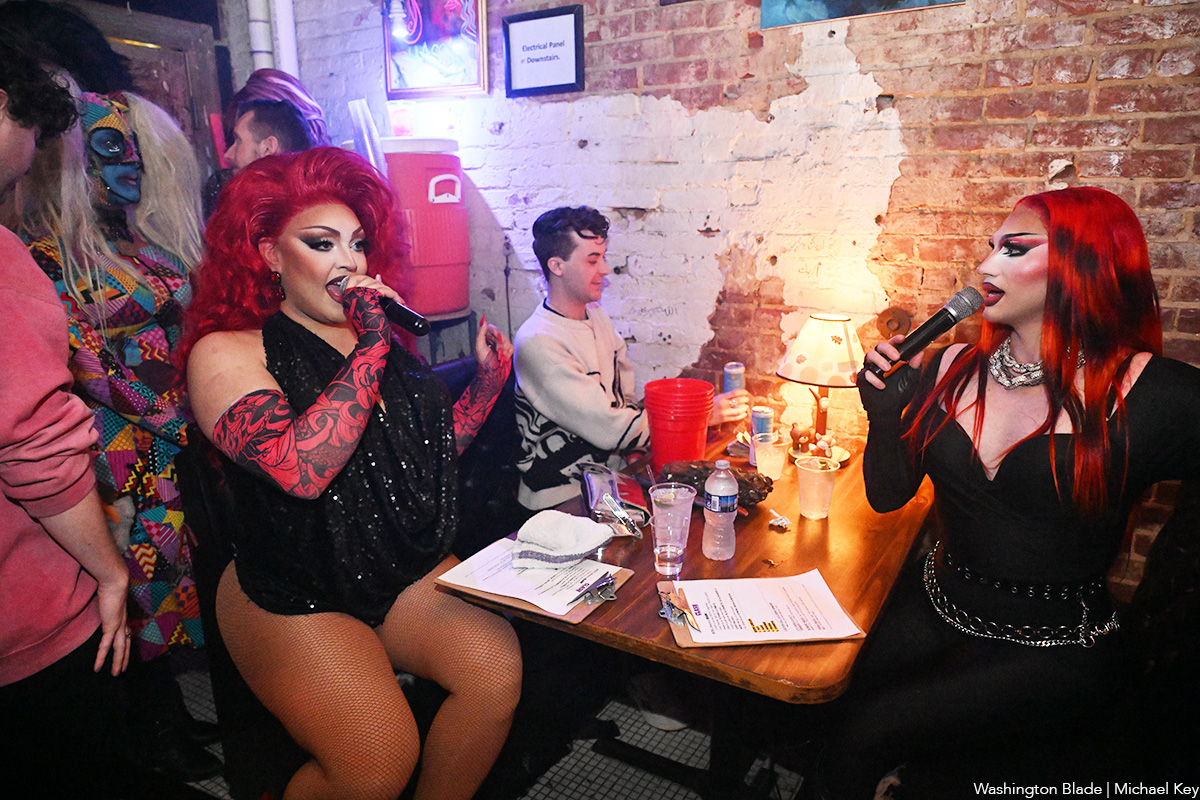
Crimsyn and Tatianna hosted the new weekly drag show Clash at Trade (1410 14th Street, N.W.) on Feb. 14, 2026. Performers included Aave, Crimsyn, Desiree Dik, and Tatianna.
(Washington Blade photos by Michael Key)
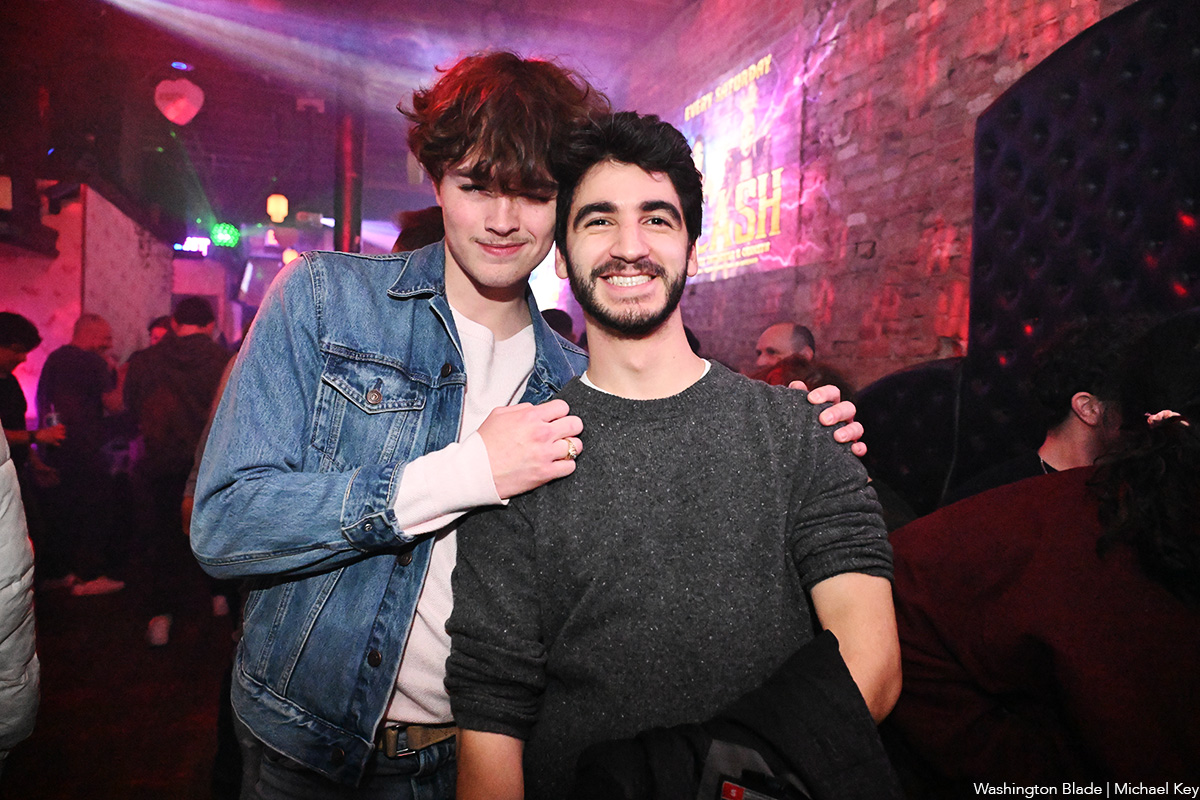
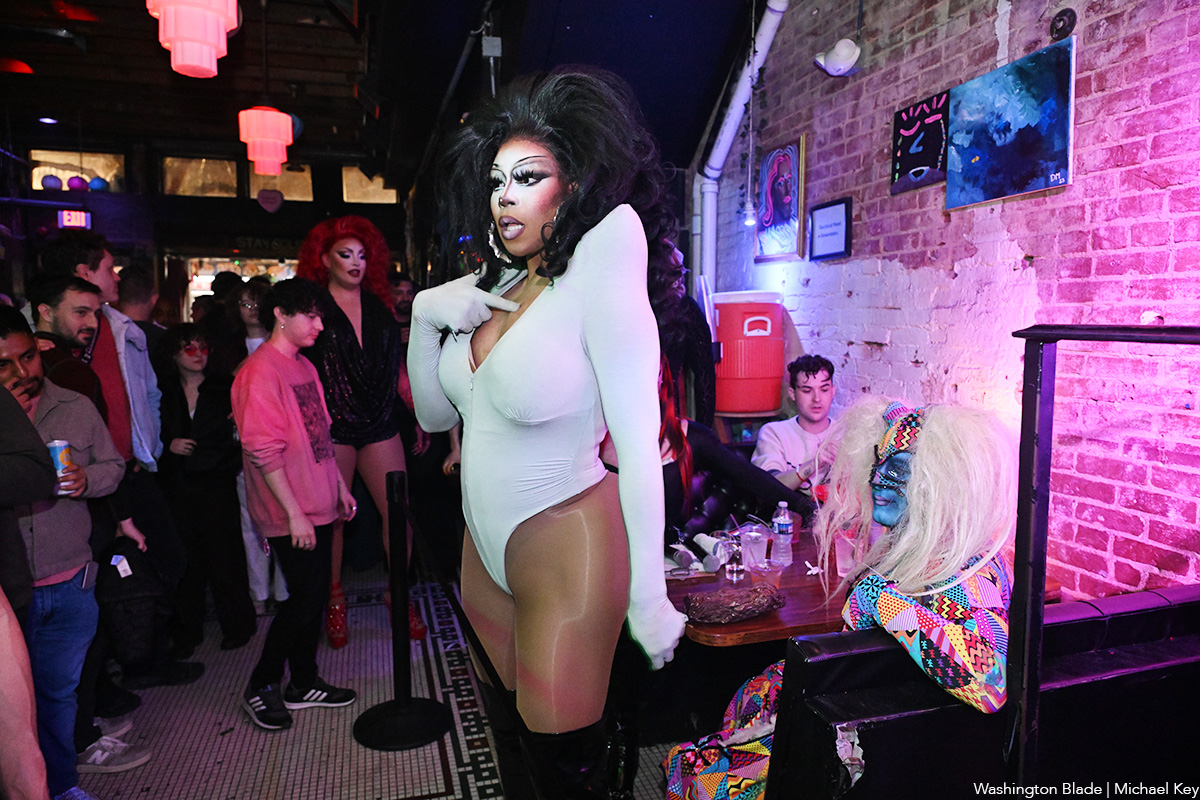
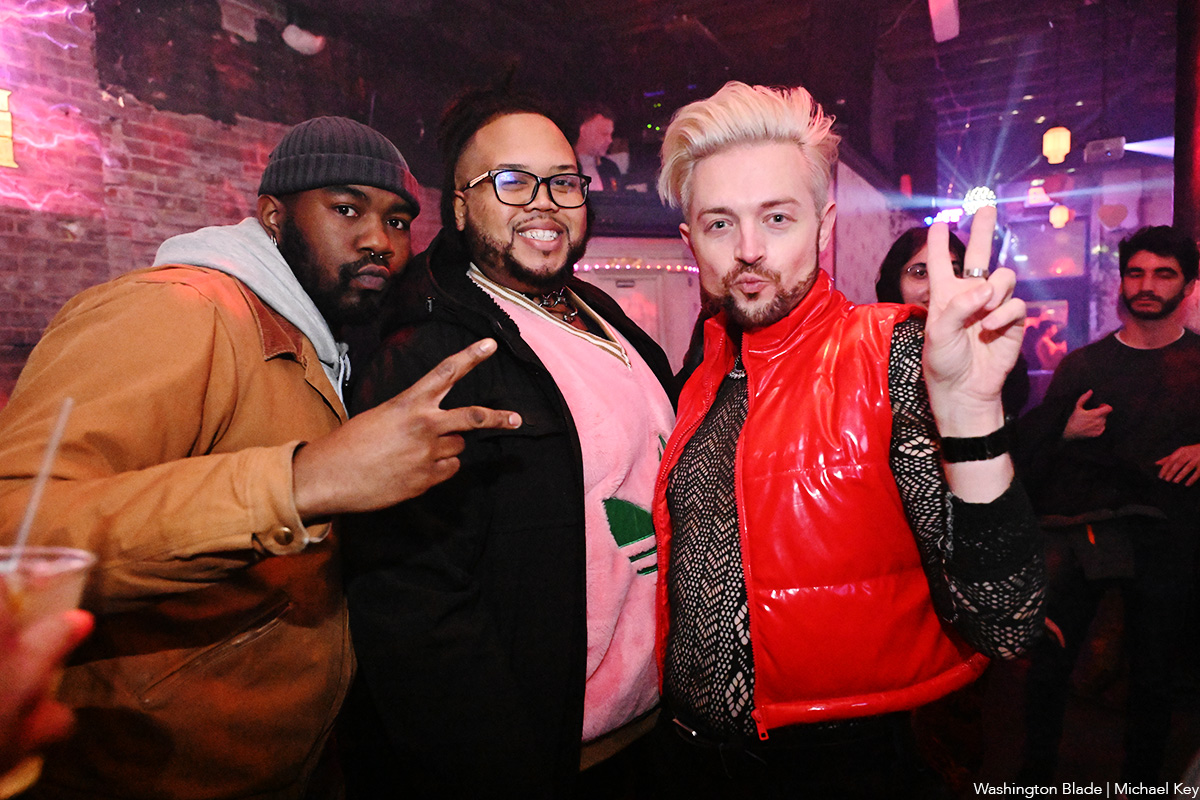
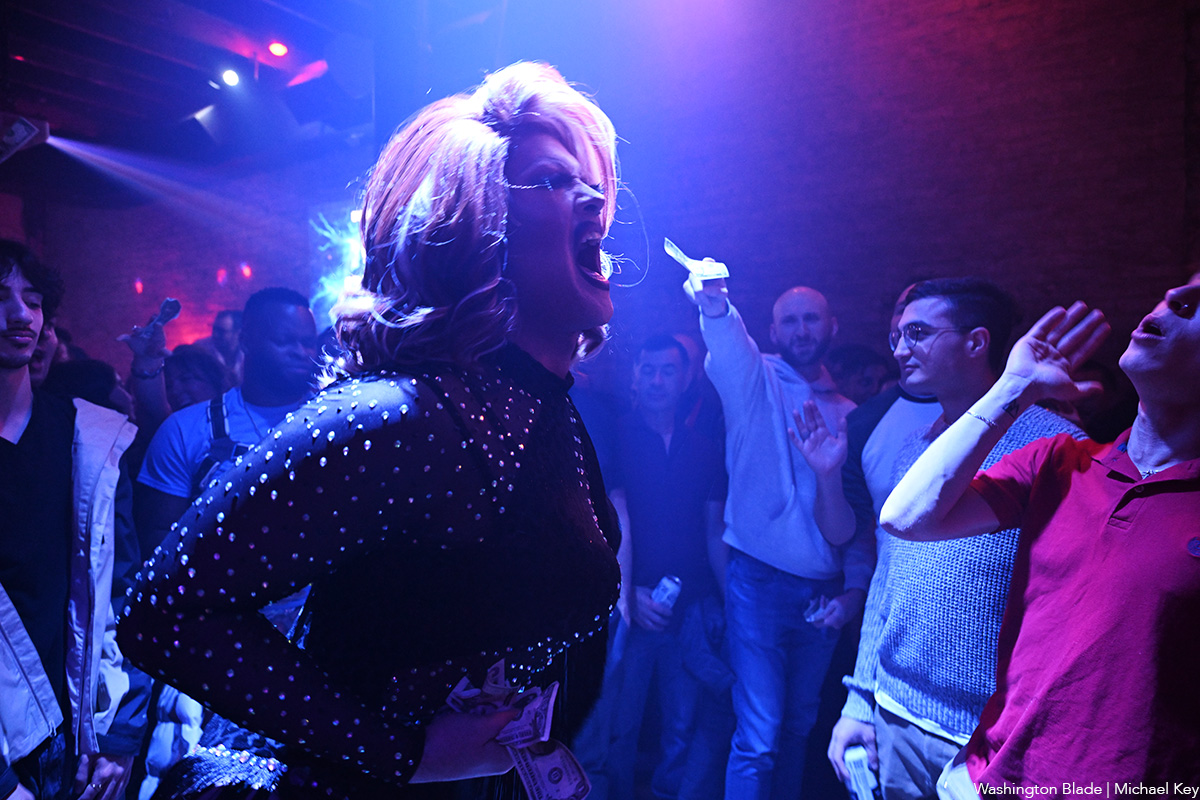
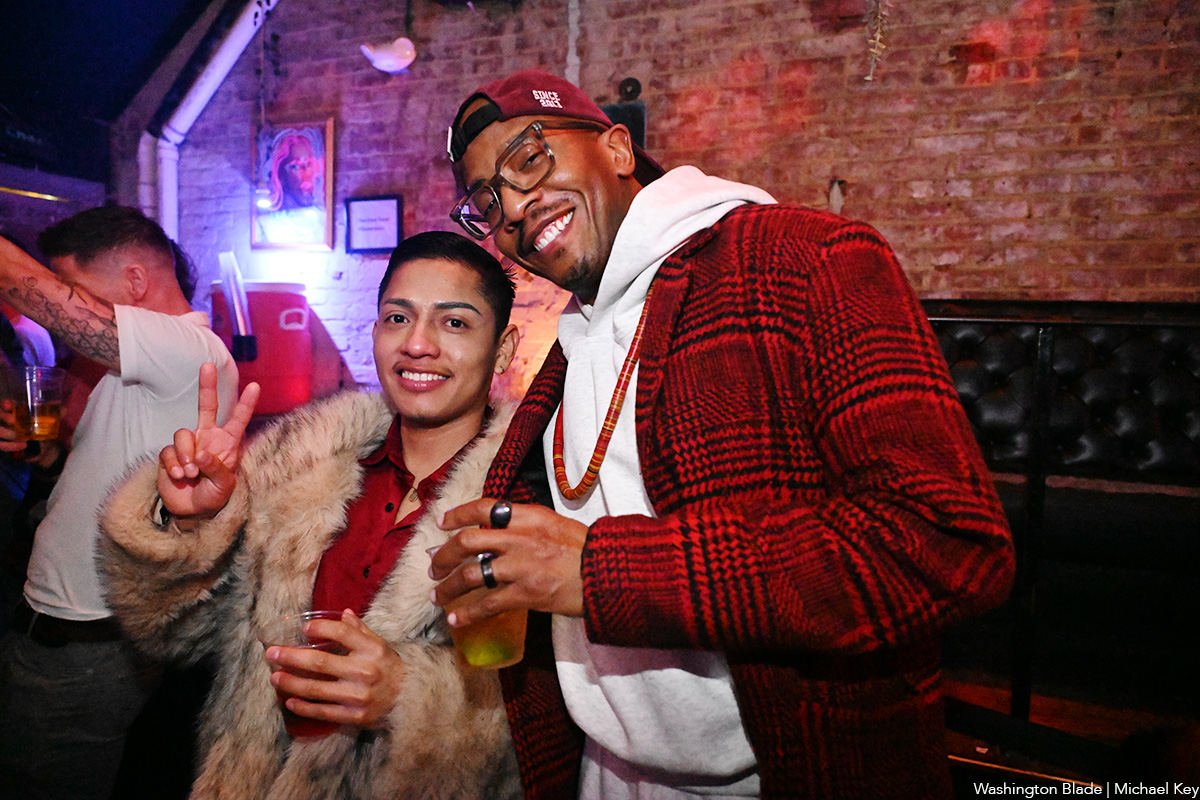
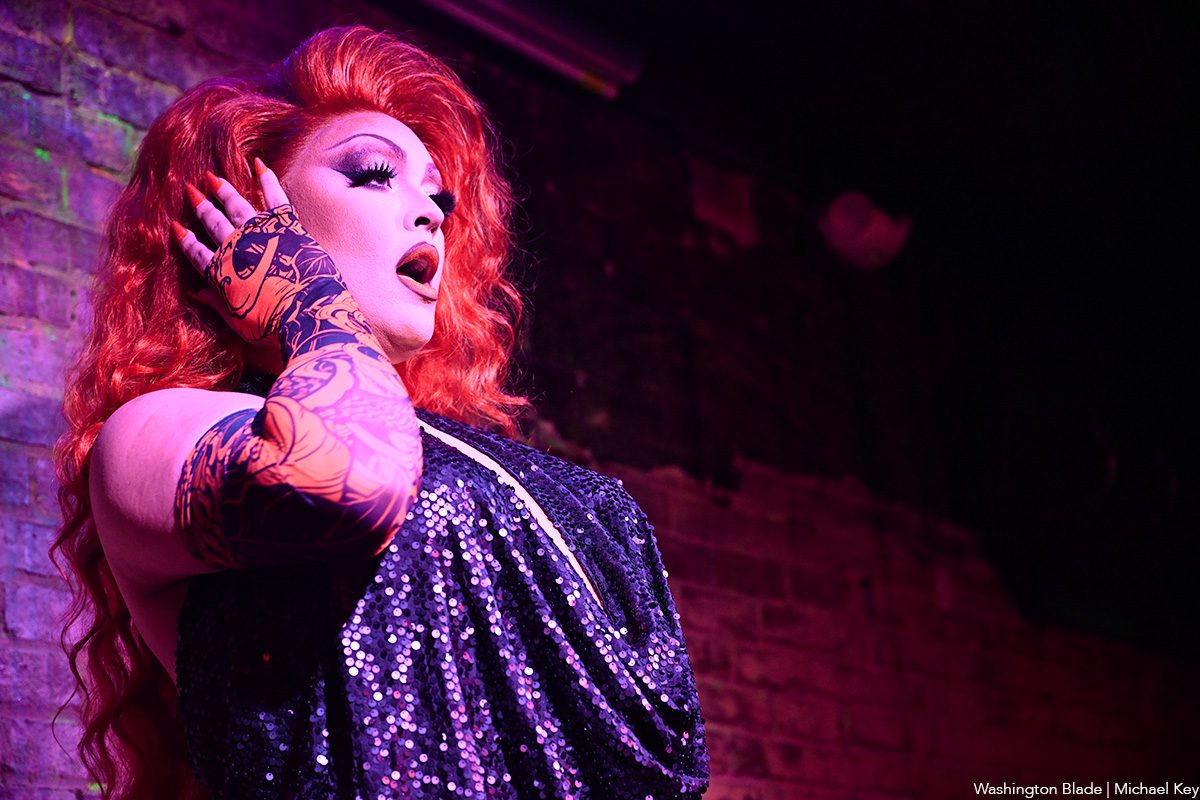
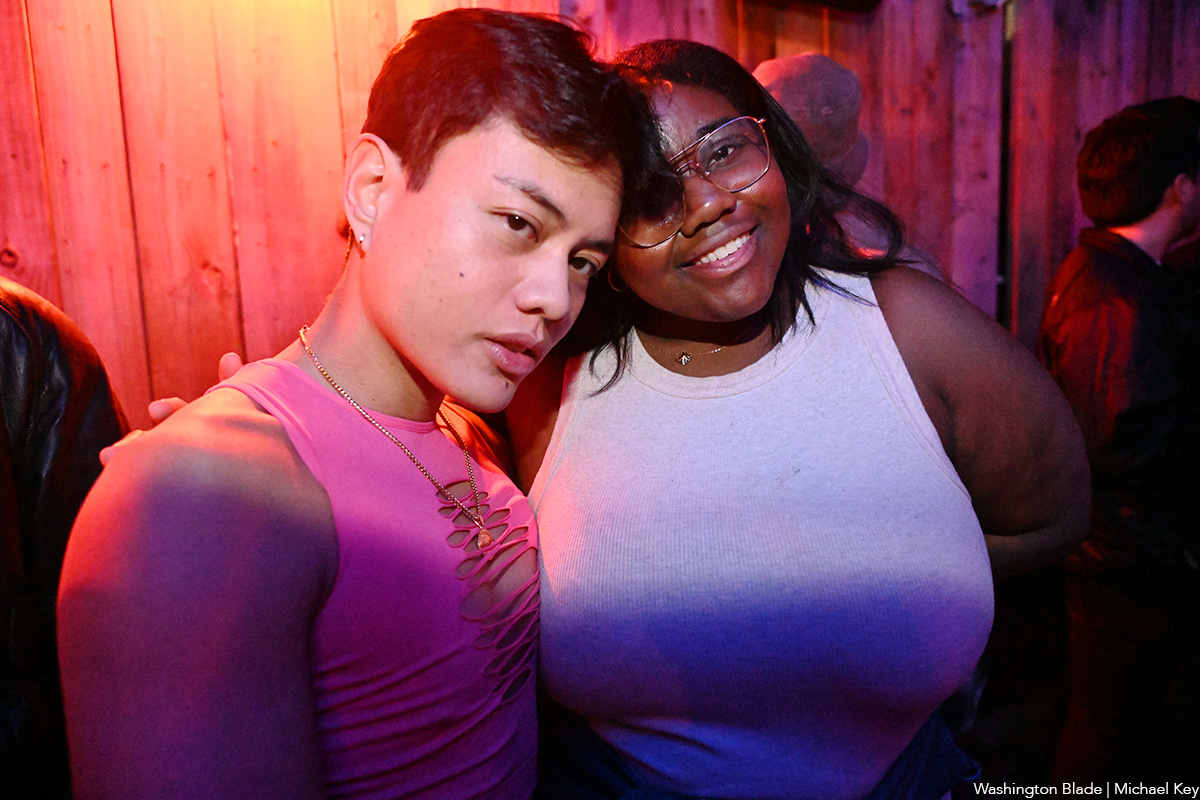
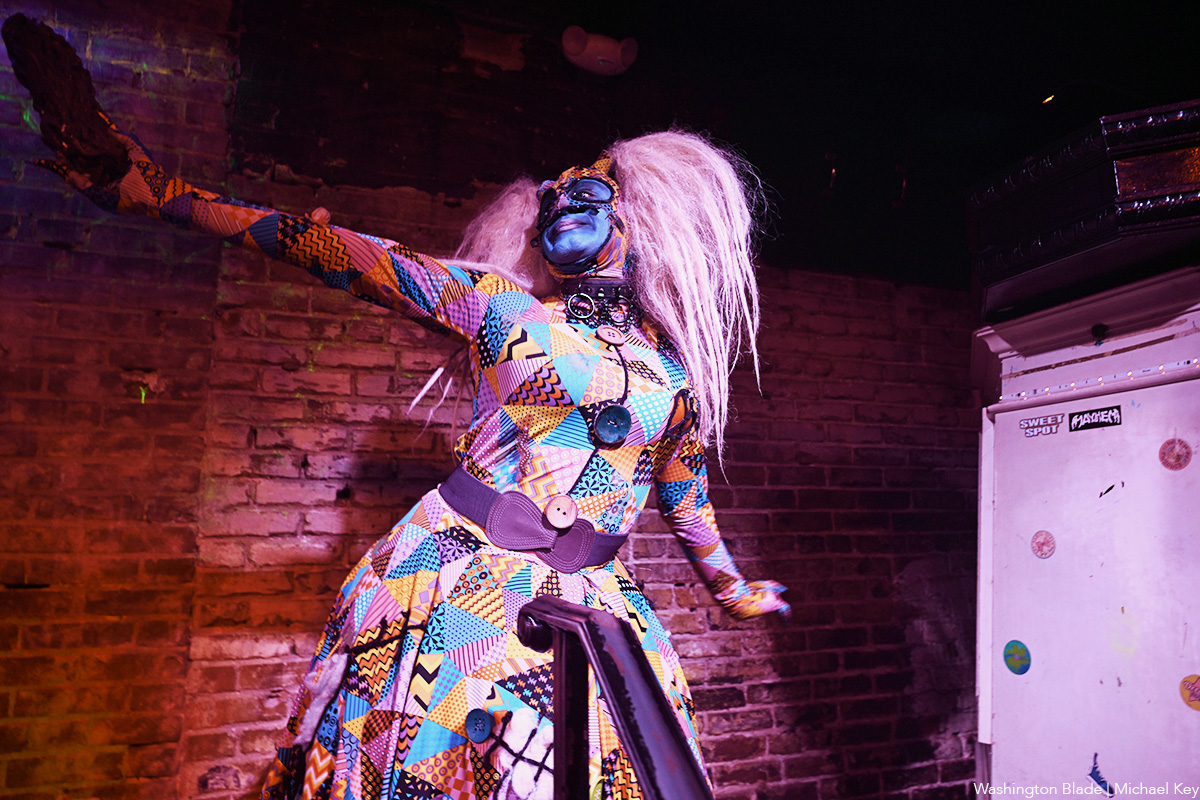
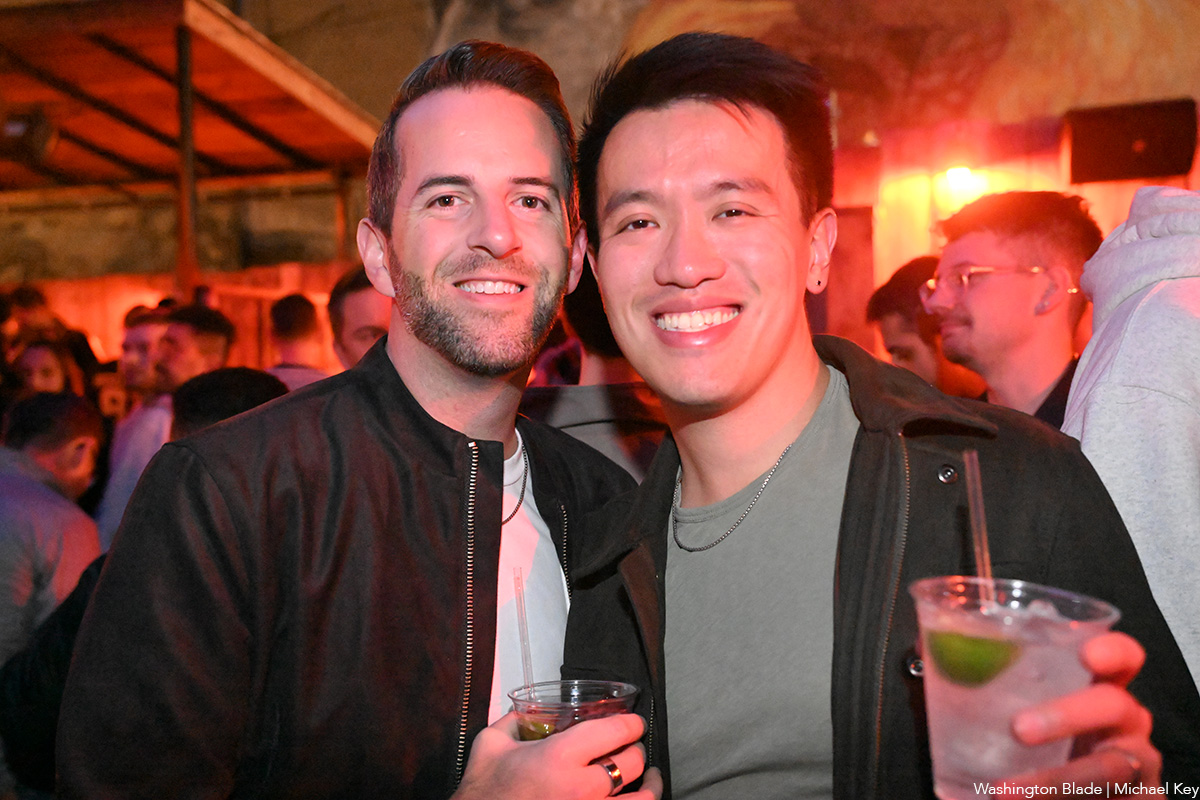
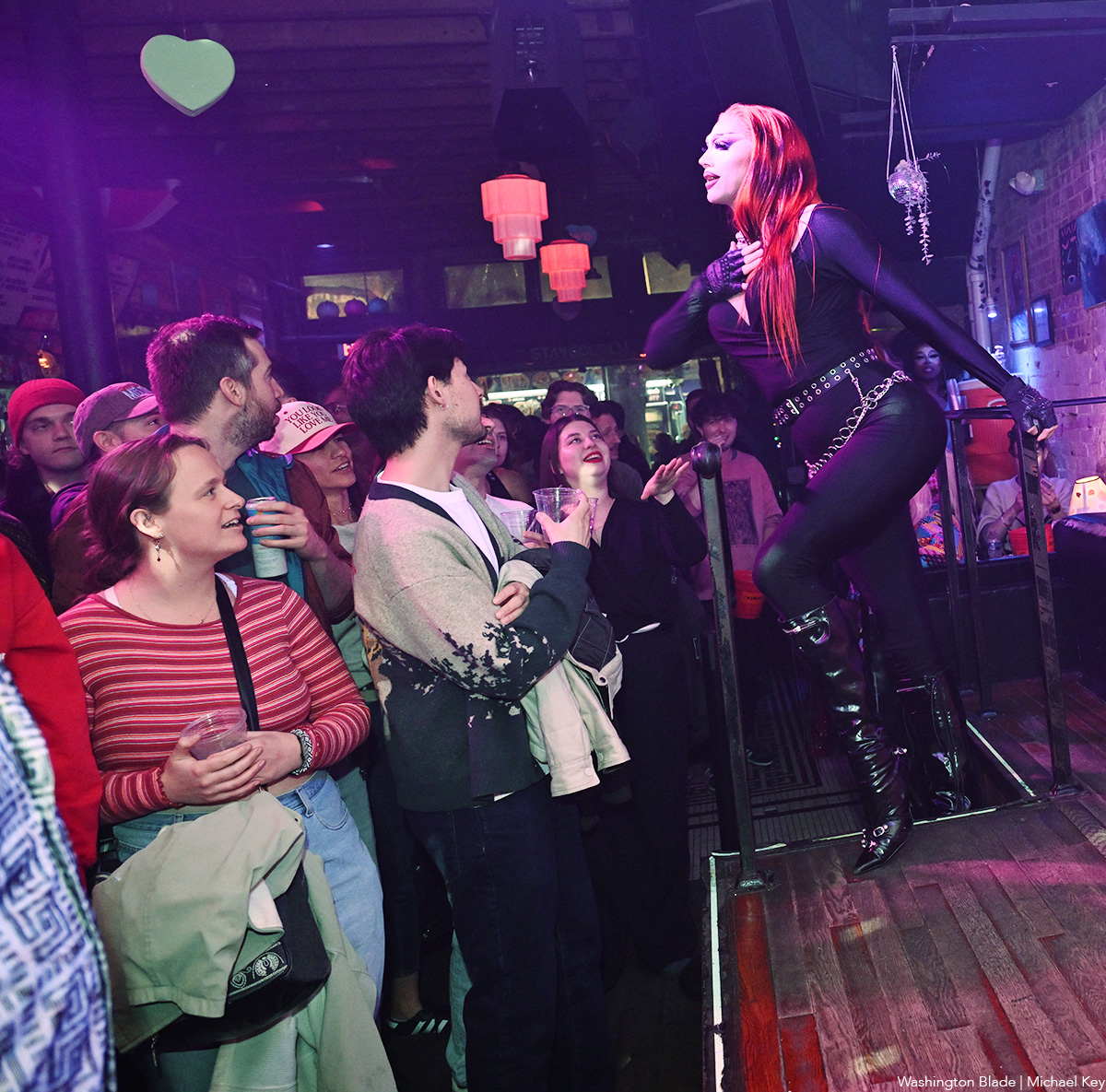
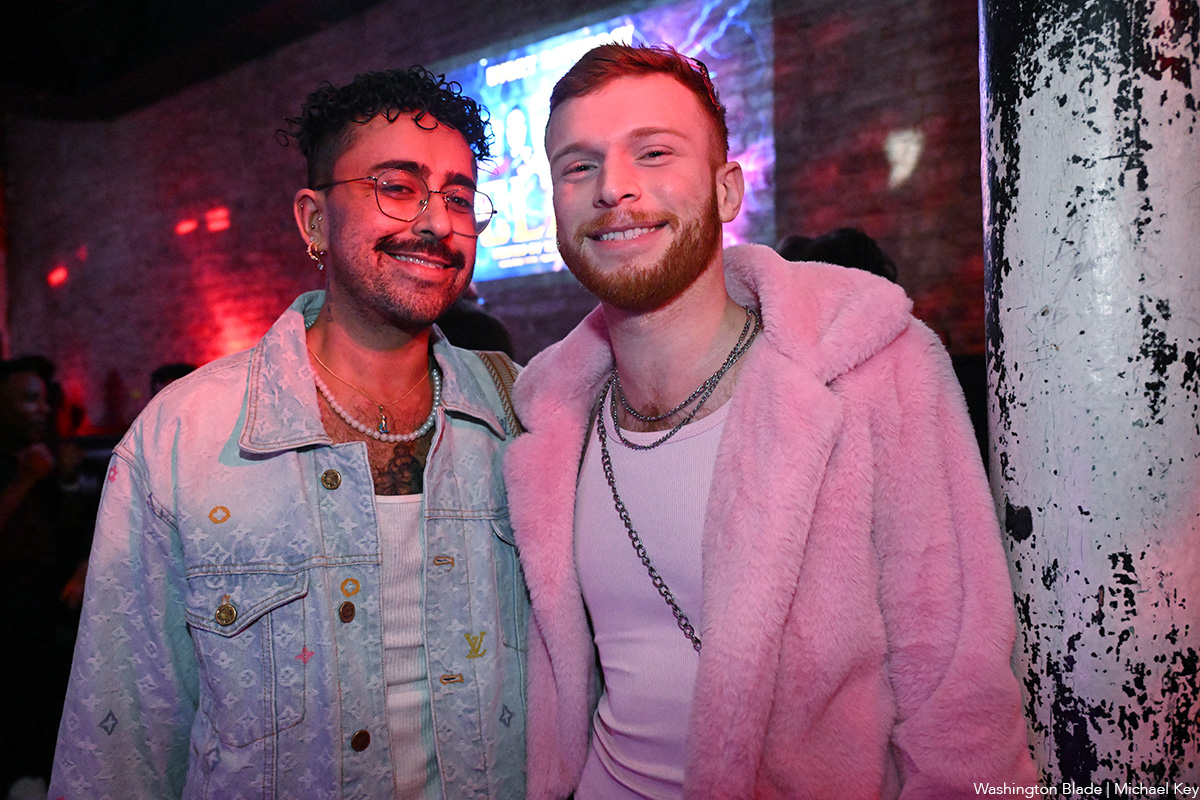
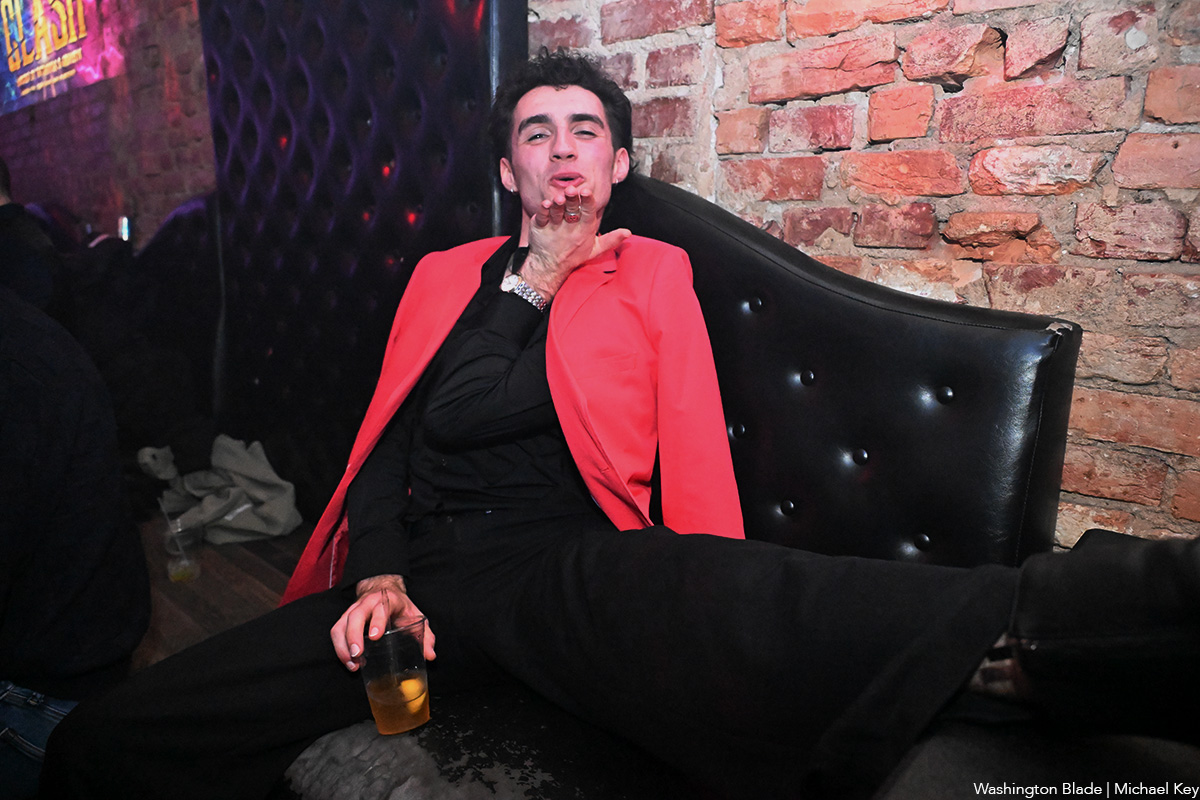
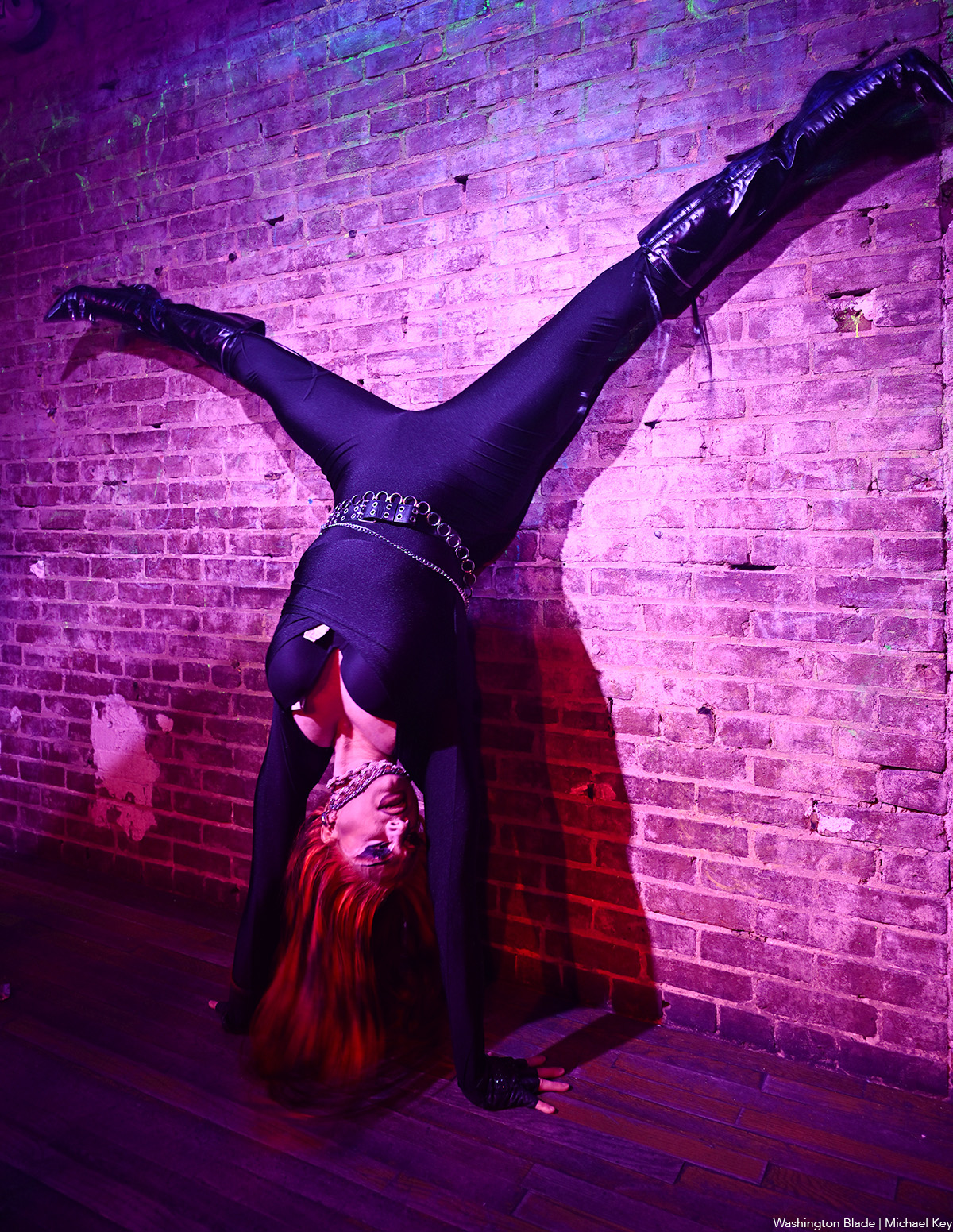
Theater
Magic is happening for Round House’s out stage manager
Carrie Edick talks long hours, intricacies of ‘Nothing Up My Sleeve’

‘Nothing Up My Sleeve’
Through March 15
Round House Theatre
4545 East-West Highway
Bethesda, Md. 20814
Tickets start at $50
Roundhousetheatre.org
Magic is happening for out stage manager Carrie Edick.
Working on Round House Theatre’s production of “Nothing Up My Sleeve,” Edick quickly learned the ways of magicians, their tricks, and all about the code of honor among those who are privy to their secrets.
The trick-filled, one-man show starring master illusionist Dendy and staged by celebrated director Aaron Posner, is part exciting magic act and part deeply personal journey. The new work promises “captivating storytelling, audience interaction, jaw-dropping tricks, and mind-bending surprises.”
Early in rehearsals, there was talk of signing a non-disclosure agreement (NDA) for production assistants. It didn’t happen, and it wasn’t necessary, explains Edick, 26. “By not having an NDA, Dendy shows a lot of trust in us, and that makes me want to keep the secrets even more.
“Magic is Dendy’s livelihood. He’s sharing a lot and trusting a lot; in return we do the best we can to support him and a large part of that includes keeping his secrets.”
As a production assistant (think assistant stage manager), Edick strives to make things move as smoothly as possible. While she acknowledges perfection is impossible and theater is about storytelling, her pursuit of exactness involves countless checklists and triple checks, again and again. Six day weeks and long hours are common. Stage managers are the first to arrive and last to leave.
This season has been a lot about learning, adds Edick. With “The Inheritance” at Round House (a 22-week long contract), she learned how to do a show in rep which meant changing from Part One to Part Two very quickly; “In Clay” at Signature Theatre introduced her to pottery; and now with “Nothing Up My Sleeve,” she’s undergoing a crash course in magic.
She compares her career to a never-ending education: “Stage managers possess a broad skillset and that makes us that much more malleable and ready to attack the next project. With some productions it hurts my heart a little bit to let it go, but usually I’m ready for something new.”
For Edick, theater is community. (Growing up in Maryland, she was a shy kid whose parents signed her up for theater classes.) Now that community is the DMV theater scene and she considers Round House her artistic home. It’s where she works in different capacities, and it’s the venue in which she and actor/playwright Olivia Luzquinos chose to be married in 2024.
Edick came out in middle school around the time of her bat mitzvah. It’s also around the same time she began stage managing. Throughout high school she was the resident stage manager for student productions, and also successfully participated in county and statewide stage management competitions which led to a scholarship at the University of Maryland, Baltimore County (UMBC) where she focused on technical theater studies.
Edick has always been clear about what she wants. At an early age she mapped out a theater trajectory. Her first professional gig was “Tuesdays with Morrie” at Theatre J in 2021. She’s worked consistently ever since.
Stage managing pays the bills but her resume also includes directing and intimacy choreography (a creative and technical process for creating physical and emotional intimacy on stage). She names Pulitzer Prize winning lesbian playwright Paula Vogel among her favorite artists, and places intimacy choreographing Vogel’s “How I learned to Drive” high on the artistic bucket list.
“To me that play is heightened art that has to do with a lot of triggering content that can be made very beautiful while being built to make you feel uncomfortable; it’s what I love about theater.”
For now, “Nothing Up My Sleeve” keeps Edick more than busy: “For one magic trick, we have to set up 100 needles.”
Ultimately, she says “For stage managers, the show should stay the same each night. What changes are audiences and the energy they bring.”
-

 Theater5 days ago
Theater5 days agoMagic is happening for Round House’s out stage manager
-

 Baltimore3 days ago
Baltimore3 days ago‘Heated Rivalry’ fandom exposes LGBTQ divide in Baltimore
-

 Real Estate3 days ago
Real Estate3 days agoHome is where the heart is
-

 District of Columbia3 days ago
District of Columbia3 days agoDeon Jones speaks about D.C. Department of Corrections bias lawsuit settlement

